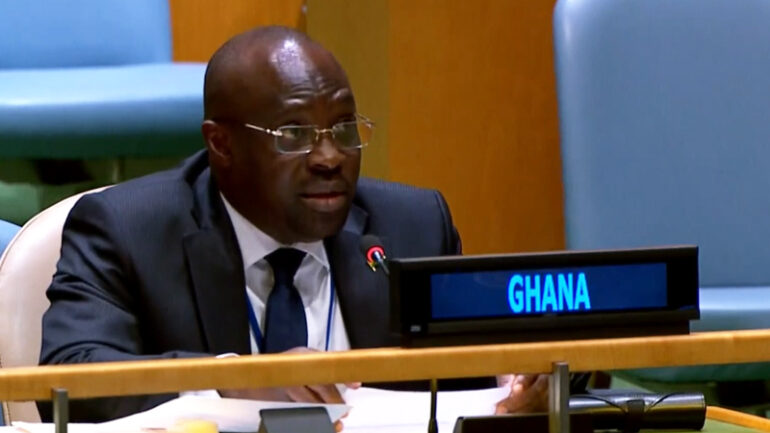United Nations General Assembly High-level meeting on Peacebuilding Financing

- Posted by admin
- Posted in Statement & Remarks
Mr. President,
Excellencies,
The convening of this High-Level Meeting on Peacebuilding Financing demonstrates the convergence of views among Member States on the need to urgently address the financing gap that exists in the peacebuilding architecture of the United Nations. As an Organisation, our Charter enjoins us to prevent wars and sustain global peace. However, as we are aware, the risks to global peace and security have in recent years increased, with conflicts situations prevailing in all the continents of the world. Now, more than ever, the need for Member States to come together and fully
commit to peacebuilding and sustaining peace has never been greater; and the UN, with a coordinating and convening capacity, has a critical role to play.
This High-Level meeting is, therefore, an opportune moment for us to reflect on how best we can mobilise action for effective financing of activities for peacebuilding and sustaining peace. As we reinforce the foundations of sustainable peace and development, it is important that we maintain a coordinated and comprehensive approach, in which we pool our efforts and resources for peacebuilding by promoting adequate, predictable, and sustainable financing. The twin resolutions of the General Assembly and the Security Council in 2020 and the numerous reports of the Secretary-General, including the report on “Our Common Agenda” have pointed out the problems and the way we must proceed. The Panel discussions held on Monday, 25th April 2022 have also reiterated what we all know is good to do and the exponential benefits that are derived from investments in peacebuilding.
Indeed, the remarkable results that are begging to emerge in peacebuilding efforts require all of us to seize the moment and bolster the efforts of the United Nations, which, working together with relevant national governments, can prevent the outbreak, escalation, and recurrence of conflict. It is in this context and mindful of the need for more creative financing options
and adequate investment to guarantee the effectiveness and sustainability of existing peacebuilding mechanisms, that Ghana makes the following four points.
First, what the Secretary-General has always said, and most of us know to be right, must be accepted and implemented. The gaps in the Peacebuilding Fund must be closed using assessed contributions, which is an optimal financing option to assure predictable, adequate, and sustainable funds for peacebuilding activities. To this end, this Assembly should decide on establishing an annual allocation of US$100 million or a symbolic 1 per cent of the total annual cost of peace operations to the Peacebuilding Fund, whichever is higher. We all know that the reliance on only voluntary contributions has proven insufficient for full mandate delivery, given the increasing demand for support from the Fund.
Secondly, besides the assessed contributions and voluntary contributions, the private sector which benefits from the dividends of peace needs to be mobilized in support of the Fund. In this regard, we believe that the UN Global Compact is a good platform to leverage engagement with the private sector even as we recognize that such mobilization efforts should not exclude private donations by individuals, foundations, and faith-based organizations.
Thirdly, it has been proven that empowering women through meaningful participation in peacebuilding helps to deepen the effectiveness and sustainability of peacebuilding measures. In this context, we welcome the progress made so far in ensuring greater inclusion of women and successful outcomes in peacebuilding through support for the Secretary-General’s target that all UN funding mechanisms in support of peacebuilding projects ensure a dedicated minimum of 15 per cent of women to advance gender equality and the empowerment of women as a principal objective.
Fourthly, in supporting the proposal by the Secretary-General for donor countries to strengthen commitments to spend at least 20 percent of ODA on peacebuilding priorities in post conflict settings, we also advocate zero coupon rates for ‘peace bonds’ for countries emerging out of conflict situations who require the fiscal space and investments necessary to stabilise the country and develop resilience.
Mr. President,
Before concluding, let me indicate that from the national perspective, Ghana remains committed to peacebuilding efforts as evidenced in her establishment of a National Peace Council (NPC), which, among others, develops and enhances national mechanisms for conflict prevention and the building of sustainable peace. We have established an accompanying Peace Fund to supplement national budget allocations for peacebuilding activities across all the 16 regions and the 260 districts of Ghana. The Fund is open to
international partnerships.
Finally, we can all recognise that the COVID-19 pandemic has placed additional pressures on the national budgets of economies, and in this context, ensuring sufficient investment in peacebuilding presents a challenge for countries affected by conflicts. Now more than ever, as Member States, we must demonstrate our commitment to peacebuilding and sustaining peace activities. We must take the right decisions now that would empower critical agents of peace such as women and the youth. Time is not on our side, and we have a responsibility to demonstrate unbridled political will to ensure that the funding gap is addressed towards the consolidation of the global peace dividends.
I thank you.
